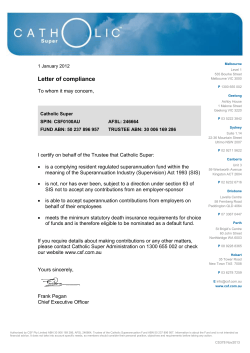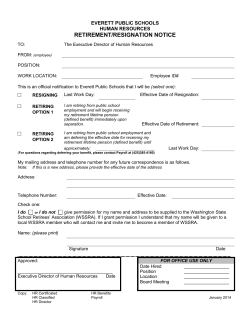
Pension pains or gains? How to make the most of one
Pension pains or gains? How to make the most of one Since the GFC, volatile markets and poor investment returns have left many people worried about their income in retirement. But with the right strategies you can maximise your entitlement to social security and receive generous tax concessions – helping to supplement your pension income and make your savings last longer. To fund a comfortable retirement, the Australian Super Funds Association (ASFA) says a couple will need $56,317 a year. Even a modest retirement is estimated to cost $32,603 annually.1 When you consider many Australians will live for 20 years or more after retiring, that’s a significant amount to save. Fortunately, if you’re approaching retirement age or even if you are already at retirement age, there are a number of ways you can make the most of social security entitlements. Here are five tips to help you maximise your retirement savings, so you can get on with enjoying your retirement. 1 Maximise pension payments If you apply for a government pension from Centrelink or the Department of Veterans’ Affairs (DVA) you will be assessed under the income and asset tests. 2 Reinvest your super If you’re aged between 55 and 59, you may be eligible to withdraw up to $180,0003 of your super benefit without paying tax on it. But did you know you can also re-contribute it to your super fund? Any amount you re-contribute is considered a personal after-tax contribution,4 so it will be part of the tax-free component of your super benefit. You can then draw a tax-free income from your super account to help you meet your living expenses until you turn 60. 3 Check if you qualify for a health care concession card If you’re under the threshold (which is adjusted each year), you’ll be eligible to receive a government pension. The amount you receive depends on the results of your tests. If you retire before pension age, you may be eligible for the lowincome health care card. This covers GP bulk billing, gives you considerably cheaper prescriptions on the PBS list and offers some other medical concessions. However, if you’re under the pension age,2 Centrelink and the DVA don’t include your superannuation in these income and asset tests, provided it is still in the accumulation (rather than pension) phase. So if you’re nearing retirement, you may want to consider selling other investments – for example, a business or investment property – then re-investing the proceeds into your super fund. At present, you can qualify for this card if your income is less than $497 per week if you’re single, or $862 per week if you’re a couple. Keep in mind that superannuation in the accumulation phase isn’t assessed, nor are account-based pensions under the deductible amount. You can have some financial investments too – at present, up to $663,575 if you’re single or $1,149,625 for couples. The contribution will be considered a personal, after-tax contribution, which is tax-free. And the value of your assessable assets will be reduced, potentially boosting your eligibility to receive a government pension. By supplementing your income with a government allowance, you can reduce the amount you need to draw from your superannuation, which can be especially useful during volatile market conditions. 4 Contribute to your still-working partner’s superannuation If you’re at an age where you can draw a pension but your spouse isn’t, you can cash out up to $450,0005 from your super and put it in your spouse’s superannuation account as an after-tax contribution. Not only will this reduce your assessable financial assets, but it will also increase the amount of pension you’re entitled to. Ask us Remember that super laws may change from year to year, and everyone’s financial circumstances are different. So make sure speak to us before putting any super strategies into action. The amount you contribute to your spouse’s super increases the tax-free component of their superannuation, potentially reducing the tax on any withdrawals. 5 Salary sacrifice while you’re still working You probably already know about salary sacrifice as a taxeffective strategy. However, there are even more benefits to salary sacrifice if you’re aged 55 or more, and plan to keep working. By asking your employer to sacrifice part of your pre-tax income directly into a super fund and then using a transition to retirement pension (TTR) to replace your salary, you could potentially reduce your tax. This is because income payments from a TTR attract a 15% tax offset when you’re aged between 55 and 59. And, once you turn 60, this income becomes tax-free. So you can increase your retirement funds without reducing the money you have to live on. What’s more, you don’t need to pay tax on investment earnings from a TTR pension, compared to 15% from other superannuation earnings. Keep in mind that if you start a TTR, under the current super laws you’ll need to draw between 4% and 10% of the account balance each year when you’re under 65. Want to know more? Talk to your financial adviser, call us on 13 13 36 or visit our website at colonialfirststate.com.au . 1 ASFA Retirement Standard, March 2013. 2 Eligibility for age pension. 3 Low rate cap for 2013/14 tax year. Indexed by AWOTE annually to the nearest $5,000. 4 Subject to excessive contribution tax or return of excessive contribution if exceeding contribution caps. 5 Be aware that benefit tax may be payable if you are aged between 55 and 59. This flyer provides general information and is not financial advice. It does not take into account your individual objectives, financial situation or needs. You should read the relevant Product Disclosure Statement (PDSs) and assess whether the information is appropriate and consider talking to your financial adviser or taxation specialist before making an investment decision. The flyer assumes that the current taxation and superannuation laws as at 1 July 2012 will continue to apply without any change and the new proposed threshold and rates for co-contribution will become law. Colonial First State Investments Limited ABN 98 002 348 352, AFS Licence 232468 (Colonial First State) is the issuer of interests in FirstChoice Personal Super, FirstChoice Wholesale Personal Super, FirstChoice Pension, FirstChoice Wholesale Pension and FirstChoice Employer Super from the Colonial First State FirstChoice Superannuation Trust ABN 26 458 298 557 and interests in the Rollover & Superannuation Fund and the Personal Pension Plan from the Colonial First State Rollover & Superannuation Fund ABN 88 854 638 840 and interests in the Colonial First State Pooled Superannuation Trust ABN 51 982 884 624. 19773/FS5671/1013
© Copyright 2025





















